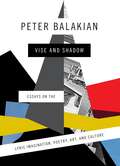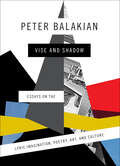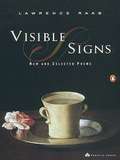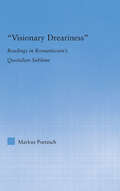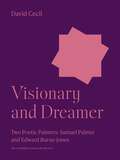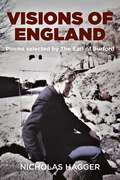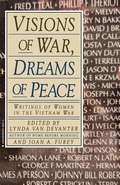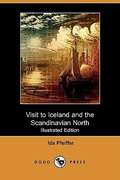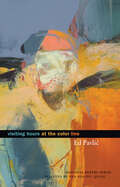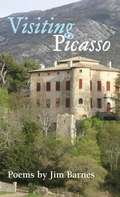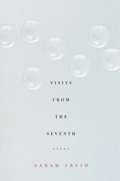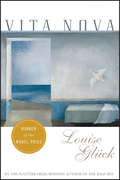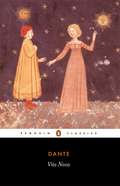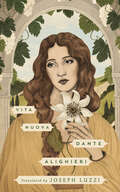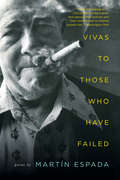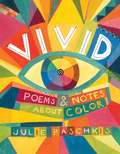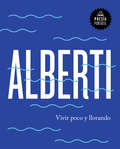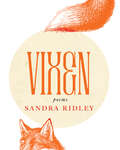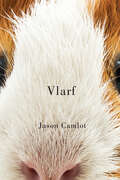- Table View
- List View
Vise and Shadow: Essays on the Lyric Imagination, Poetry, Art, and Culture
by Peter BalakianPeter Balakian is a renowned poet, scholar, and memoirist; but his work as an essayist often prefigures and illuminates all three. "I think of vise and shadow as two dimensions of the lyric (literary and visual) imagination," he writes in the preface to this collection, which brings together essayistic writings produced over the course of twenty-five years. Vise, "as in grabbing and holding with pressure," but also in the sense of the vise-grip of the imagination, which can yield both clarity and knowledge. Consider the vise-grip of some of the poems of our best lyric poets, how language might be put under pressure "as carbon might be put under pressure to create a diamond. " And shadow, the second half of the title: both as noun, "the shaded or darker portion of the picture or view or perspective," "partial illumination and partial darkness"; and as verb, to shadow, "to trail secretly as an inseparable companion" or a "force that follows something with fidelity; to cast a dark light on something--a person, an event, an object, a form in nature. " Vise and Shadow draws into conversation such disparate figures as W. B. Yeats, Hart Crane, Joan Didion, Primo Levi, Robert Rauschenberg, Bob Dylan, Elia Kazan, and Arshile Gorky, revealing how the lyric imagination of these artists grips experience, "shadows history," and "casts its own type of illumination," creating one of the deepest kinds of human knowledge and sober truth. In these elegantly written essays, Balakian offers a fresh way to think about the power of poetry, art, and the lyrical imagination as well as history, trauma, and memory.
Vise and Shadow: Essays on the Lyric Imagination, Poetry, Art, and Culture
by Peter BalakianPeter Balakian is a renowned poet, scholar, and memoirist; but his work as an essayist often prefigures and illuminates all three. "I think of vise and shadow as two dimensions of the lyric (literary and visual) imagination," he writes in the preface to this collection, which brings together essayistic writings produced over the course of twenty-five years. Vise, "as in grabbing and holding with pressure," but also in the sense of the vise-grip of the imagination, which can yield both clarity and knowledge. Consider the vise-grip of some of the poems of our best lyric poets, how language might be put under pressure "as carbon might be put under pressure to create a diamond." And shadow, the second half of the title: both as noun, "the shaded or darker portion of the picture or view or perspective," "partial illumination and partial darkness"; and as verb, to shadow, "to trail secretly as an inseparable companion" or a "force that follows something with fidelity; to cast a dark light on something—a person, an event, an object, a form in nature."Vise and Shadow draws into conversation such disparate figures as W. B. Yeats, Hart Crane, Joan Didion, Primo Levi, Robert Rauschenberg, Bob Dylan, Elia Kazan, and Arshile Gorky, revealing how the lyric imagination of these artists grips experience, "shadows history," and "casts its own type of illumination," creating one of the deepest kinds of human knowledge and sober truth. In these elegantly written essays, Balakian offers a fresh way to think about the power of poetry, art, and the lyrical imagination as well as history, trauma, and memory.
Visible Signs
by Lawrence RaabA poem by Lawrence Raab is a carefully chosen and precisely rendered moment—a poised and elegant meditation on the nature of memory. This new collection includes a selection from each of Raab's five previous books of poetry, as well as twenty-one new poems. Readers will delight in their wide-ranging subjects, from "Miles Davis on Art" to "Saint Augustine's Dog," from the inventions of Rube Goldberg to the recklessness of dreams. .
Visible Signs
by Lawrence RaabA poem by Lawrence Raab is a carefully chosen and precisely rendered moment--a poised and elegant meditation on the nature of memory. This new collection includes a selection from each of Raab's five previous books of poetry, as well as twenty-one new poems. Readers will delight in their wide-ranging subjects, from "Miles Davis on Art" to "Saint Augustine's Dog," from the inventions of Rube Goldberg to the recklessness of dreams.
Visionary Dreariness: Readings in Romanticism's Quotidian Sublime (Literary Criticism and Cultural Theory)
by Markus PoetzschVisionary Dreariness: Readings in Romanticism’s Quotidian Sublime undertakes a reconceptualization of the theoretical and experiential framework of the Romantic sublime by shifting the focus from Burke’s and Kant’s prescriptions of natural vastness and grandeur to the narrower but no less wondrous spaces, objects and experiences of everyday life. This shift is defined as a descent from mountaintops to an encounter, in William Blake’s terms, with 'a World in a Grain of Sand.' The purpose of this book is to sift the literature of the Romantic everyday, both prose and poetry, canonical and noncanonical, for such grains. In order to define the inherently amorphous and subsumptive sphere called 'everyday life,' the author draws upon two main theoretical threads: the first, based on the phenomenological poetics of Gaston Bachelard, serves to elucidate the depth and diversity of everyday household space; the second, comprising the work of Henri Lefebvre and Michel de Certeau, defines the generative potential, what de Certeau glosses as the 'everyday creativity,' of some of the most basic human activities such as walking, reading and washing, to name but a few. The role of the everyday in Romantic literature has in recent years received greater scholarly attention, particularly from critics dissatisfied with the perpetuation of what Karina Williamson characterizes as a 'debased Romanticism which rules there is a category of experience and expression which is poetic and all the rest is ordinary and inadmissible.' The present study serves to map the intersections of these categories of experience and expression—the sublime and the quotidian—and thereby to challenge our assumptions about the aesthetic value of the everyday not only in the Romantic period but also in our own.
Visionary and Dreamer: Two Poetic Painters: Samuel Palmer and Edward Burne-Jones (The A. W. Mellon Lectures in the Fine Arts #15)
by David CecilAn eminent literary biographer and critic shows how poetry enriched the art of two representative English Romantic paintersIn Visionary and Dreamer, David Cecil evokes the century of the poet-painter, when painting drew much of its inspiration from imaginative literature. Samuel Palmer (1805–1881), an unworldly visionary, obscure in his lifetime but now a recognized master, and Edward Burne-Jones (1833–1898), the Pre-Raphaelite daydreamer, once revered as a great painter but later admired chiefly for his work in applied art, emerge as artists who turned to their own inner lives to interpret Shakespeare, Milton, and Keats.
Visions of England: Poems Selected by the Earl of Burford
by Nicholas HaggerIn 1999, while working as his Literary Secretary, the Earl of Burford, a descendant of the 3rd Earl of Southampton (Shakespeare&’s patron) and of the 17th Earl of Oxford and heir to the Dukedom of St Albans, made a selection of Nicholas Hagger&’s poems that celebrates places in England, conveys his mystical awareness of the unity of the universe and places him in the visionary tradition of William Blake, the poet of &‘Jerusalem&’ and &“England&’s green and pleasant land&”. Soon after Visions of England was completed the Earl of Burford came to international attention when he leapt onto the Woolsack of the House of Lords in a principled protest against the Blair Government&’s plan to abolish hereditary peers&’ voting rights, which led to 92 remaining in the Lords. A few months later he left Nicholas Hagger&’s employ and the selection was buried under papers for nearly 20 years. In 2018 Nicholas Hagger came across Visions of England while preparing papers to send to his archive. It now seemed as if the selection had been made with Brexit in mind. The places are full of English history and culture, and the poems are prophetic in their anticipation of England&’s new spirit of independence. These poems convey Englishness with a freshness and vividness that startle. The Earl of Burford is a prominent lecturer and biographer, and his selection is noteworthy for the metaphysical perspective he brings out in Nicholas Hagger&’s profound poems whose traditional qualities constantly surprise and delight.
Visions of War, Dreams of Peace: Writings of Women in the Vietnam WarPeace
by Lynda Van Devanter Joan A. FureyThe women who contributed to this anthology were nurses, military personnel, Red Cross workers, and Vietnamese civilians - all of whom had firsthand experience with the Vietnam War. Their poems reveal the human side of the conflict and give voice to the role of women during warfare. This sale of this book helped to fund the Vietnam Women's Memorial in Washington, D. C.
Visit to Iceland and the Scandinavian North
by Ida PfeifferA besetting sin of the Icelanders is their drunkenness. Their poverty would probably not be so great if they were less devoted to brandy, and worked more industriously. <P> <P> It is dreadful to see what deep root this vice has taken. Not only on Sundays, but also on week-days, I met peasants who were so intoxicated that I was surprised how they could keep in their saddle. I am, however, happy to say that I never saw a woman in this degrading condition.
Visiting Hours at the Color Line: Poems (National Poetry Ser.)
by Ed PavlicThe acclaimed poet finds many-hued complexity within America’s divided black-and-white society in this 2012 National Poetry Series–winning collection.American attitudes and perceptions—of tragedies, major events, each other—are often segregated into two camps by a politicized, racially divided “Color Line.” But in this award-winning poetry collection, Ed Pavlic explores the nonlinear aspects of our cultural divide. Where, he asks, is the Color Line in the mind, in the body, between bodies, between human beings?In daring prose poems and powerful free verse, Pavlic tracks American characters through situations both mundane and momentous. He exposes the many textures of this social, historical world as it seeps into the private dimensions of our lives. The resulting poems are intense, intimate, and psychologically probing, making Visiting Hours at the Color Line a poetic tour de force.
Visiting Picasso
by Jim BarnesDetective Sergeant John Niven believed that he had adjusted to being adopted long ago. But a personal crisis makes him wonder about his origins, his career, and his future with his girlfriend Gill. Simultaneously, he is hunting a killer who might well be a fellow policeman, and when Gill becomes inexplicably entangled, Niven sinks deeper into the case. When he identifies a break in the investigation it helps him unravel the killer’s purpose and, he believes, the killer’s identity. In a final confrontation, it appears the fates have been cruelly mocking him and it seems he really is an orphan of chance.
Visits from the Seventh
by Sarah ArvioVisits from the Seventh is a highly original debut. Arvio's wry, uncanny poems take the form of conversations between a woman and a throng on invisible presences--visitors, as she calls them--who counsel, challenge, cajole and comfort her. Together they murmur about destiny, the moon, a walk on Park Avenue, sex, ambition, dreams."Poets," writes Richard Howard, "find remarkable ways to talk to themselves, to divide and triumph, to split the speech-atom--'the journal of my other self,' Rilke called it. For women poets, (Christina Rossetti, say, or Virginia Woolf) voices from 'outside' are minatory; for men they are merely the Muse. Arvio has listened hard and heedfully to these hauntings of hers, certainly the most 'convincing' visitations since Merrill's Ouija-board transcriptions, and has arranged her overhearing in the readiest manner for her own listeners: the careful, shapely stanzas; the clear conundrum of spirit possession, which is Arvio's poetic incarnation. The whole series is an articulation of what we used to call 'the inner life': one woman's passionate questioning of her sources, and their equally passionate (if often derisive) answers. She has forged her own dialogue of the dead, somehow managing to be funny and erotic at once, pursued and in possession. I love hearing her persuasive voices; they are the woman herself."From the Hardcover edition.
Vistas in Reading Literature (Gold Level)
by Mary Ann Trost Jacqueline L. Chaparro Judith L. Joyce Rena MoranVistas in Reading Literature, Gold Level will introduce you to a wide variety of literature. You will read stories, poems, plays, and works of nonfiction in their original forms. These works have been written by world-famous authors such as Lewis Carroll, Joan Aiken, Isaac Asimov, Jean Craighead, Langston Hughes, Yoshiko Uchida, Lloyd Alexander, and Nikki Giovanni. Some of the works may make you laugh and others may make you cry. All of them should make you think.
Vistas in Reading Literature (Green Level)
by Mary Ann Trost Jacqueline L. ChaparroReading Literature will introduce you to a wide variety of literature. You will read stories, poems, plays, and works of nonfiction in their original forms. These works have been written by world-famous authors such as Anton Chekhov, Joan Aiken, Isaac Asimov, A. A. Milne, Langston Hughes, Rosemary Sutcliff, Carl Sandburg, and Alice Walker. Some of the works may make you laugh and others may make you cry. All of them should make you think.
Vita Nova
by Louise GluckWinner of the Nobel Prize in LiteratureIn Vita Nova, Pulitzer-Prize winning poet Louise Glück manages the apparently impossible: a terrifying act of perspective that brings into resolution the smallest human hope and the vast forces that shape and thwart itSince Ararat in 1990, Louise Glück has been exploring a form that is, according to the poet, Robert Hass, her invention. Vita Nova--like its immediate predecessors, a booklength sequence--combines the ecstatic utterance of The Wild Iris with the worldly dramas elaborated in Meadowlands. Vita Nova is a book that exists in the long moment of spring: a book of deaths and beginnings, resignation and hope; brutal, luminous, and far-seeing.Like late Yeats, Vita Nova dares large statement. By turns stern interlocutor and ardent novitiate, Glück compasses the essential human paradox. In Vita Nova, Louise Glück manages the apparently impossible: a terrifying act of perspective that brings into resolution the smallest human hope and the vast forces that thwart and shape it.
Vita Nuova
by Dante AlighieriA unique treatise by a poet, written for poets, on the art of poetry, LA VITA NUOVA is elaborately and symbolically patterned, consisting of a selection of Dante's early poems, interspersed with his own prose commentary. The poems themselves tell the story of his love for Beatrice, from their first meeting at a May Day party in her father's house, through Dante's sufferings and his attempts to conceal the true object of his devotion by the use of 'screen-loves', to his overwhelming grief ather death, ending with the transformative vision of her in heaven. These are some of the richest love poems in literature and the movement from self-pitying lament to praise for the beloved's beauty and virtue, illustrate the elevating power of love.
Vita Nuova
by Dante Alighieri"Perhaps this lovely little Liveright edition deserves to become the new standard." —Steve Donoghue, Open Letters Review Dante’s first masterpiece in an enticing new translation by one of our most beloved teachers of Italian literature and culture. Part love story, part instruction manual, part spiritual journey, Dante’s “little book,” the Vita Nuova, has had a profound and far-reaching influence on global culture and is considered by many to be the perfect expression of the medieval ideal of courtly love, as well as an essential precursor to Dante’s sublime poetic apotheosis, the Divine Comedy. Now Joseph Luzzi, celebrated author of books about Italian literature and culture and a lifelong lover and teacher of Dante’s poetry, gives us a version of the Vita Nuova that is fresh, contemporary, and approachable—as vital and vivid as Dante’s original Tuscan dialect—rendered in a voice that will entice a new generation of readers to swoon over one of the most heartbreaking stories of unfulfilled love in all of world literature.
Vivas to Those Who Have Failed: Poems
by Martín EspadaAward-winning poet Martín Espada gives voice to the spirit of endurance in the face of loss. In this powerful new collection of poems, Martín Espada articulates the transcendent vision of another, possible world. He invokes the words of Whitman in “Vivas to Those Who Have Failed,” a cycle of sonnets about the Paterson Silk Strike and the immigrant laborers who envisioned an eight-hour workday. At the heart of this volume is a series of ten poems about the death of the poet’s father. “El Moriviví” uses the metaphor of a plant that grows in Puerto Rico to celebrate the many lives of Frank Espada, community organizer, civil rights activist, and documentary photographer, from a jailhouse in Mississippi to the streets of Brooklyn. The son lyrically imagines his father’s return to a bay in Puerto Rico: “May the water glow blue as a hyacinth in your hands.” Other poems confront collective grief in the wake of the killings at the Sandy Hook Elementary School and police violence against people of color: “Heal the Cracks in the Bell of the World” urges us to “melt the bullets into bells.” Yet the poet also revels in the absurd, recalling his dubious career as a Shakespearean “actor,” finding madness and tenderness in the crowd at Fenway Park. In exquisitely wrought images, Espada’s poems show us the faces of Whitman’s “numberless unknown heroes.”
Vivid: Poems & Notes About Color
by Julie PaschkisPlayful poems and facts celebrate the colors of the rainbow in this beautiful nonfiction picture book. Orange you sweet? Orange you plump and juicy? Orange you my favorite fruit?Hey - you’re a tangerine!B-lime-y.With information about the science of sight and perception, pigment origins in art and textiles, colloquial expressions and word associations, there's so much to see in each vivid spread—a wonderfully sensory read.- GODWIN BOOKS -
Vivir poco y llorando
by Rafael AlbertiLa colección «Poesía portátil» nos trae Vivir poco y llorando, antología que permite explorar el mundo lírico de Rafael Alberti, uno de los poetas más representativos de la Generación del 27. Una reflexión de una intensidad extraordinaria sobre el amor, la nostalgia y el exilio. Esta selección recoge algunos de los poemas de un autor que ha llenado con sus versos las páginas más importantes de la poesía contemporánea, configurando una obra vasta y poderosa, comprometida con la lengua y la colectividad. Rafael Alberti (1902-1999) nació en Puerto de Santa María y en 1917 se trasladó con su familia a Madrid. Abandonó los estudios y se dedicó a la pintura. Sin embargo, a partir de 1921 consolidó su vocación poética y en los años siguientes frecuentó la Residencia de Estudiantes, donde conoció a Lorca, Dalí, Buñuel y otros artistas de la Generación del 27. En 1925 obtuvo el Premio Nacional de Literatura con Marinero en tierra. Tras la Guerra Civil, empezó un largo exilio que le llevó primero a París, donde trabó amistad con Neruda y Picasso, y luego a Argentina y Roma. Finalmente, el 27 de abril de 1977, treinta y ocho años más tarde, regresó a España. Personaje singular de nuestra historia reciente, su vida está ligada durante casi un siglo a los acontecimientos culturales, políticos y sociales más destacados de nuestro país. -------«A través de los siglos,por la nada del mundo,yo, sin sueño, buscándote.»-------
Vivir poco y llorando (Flash Poesía #Volumen)
by Rafael AlbertiLa colección «Poesía portátil» nos trae Vivir poco y llorando, antología que permite explorar el mundo lírico de Rafael Alberti, uno de los poetas más representativos de la Generación del 27. Una reflexión de una intensidad extraordinaria sobre el amor, la nostalgia y el exilio. Esta selección recoge algunos de los poemas de un autor que ha llenado con sus versos las páginas más importantes de la poesía contemporánea, configurando una obra vasta y poderosa, comprometida con la lengua y la colectividad. Rafael Alberti (1902-1999) nació en Puerto de Santa María y en 1917 se trasladó con su familia a Madrid. Abandonó los estudios y se dedicó a la pintura. Sin embargo, a partir de 1921 consolidó su vocación poética y en los años siguientes frecuentó la Residencia de Estudiantes, donde conoció a Lorca, Dalí, Buñuel y otros artistas de la Generación del 27. En 1925 obtuvo el Premio Nacional de Literatura con Marinero en tierra. Tras la Guerra Civil, empezó un largo exilio que le llevó primero a París, donde trabó amistad con Neruda y Picasso, y luego a Argentina y Roma. Finalmente, el 27 de abril de 1977, treinta y ocho años más tarde, regresó a España. Personaje singular de nuestra historia reciente, su vida está ligada durante casi un siglo a los acontecimientos culturales, políticos y sociales más destacados de nuestro país. -------«A través de los siglos,por la nada del mundo,yo, sin sueño, buscándote.»-------
Vixen
by Sandra RidleyGriffin Poetry Prize finalist Sandra Ridley offers a breathtaking, harrowing immersion in cruelty behind different veils: the medieval hunt, ecological collapse, and intimate partner violence. Sparked by a haunting chance encounter with a fox, and told in six chapters of varying form, Vixen is as visceral as it is mysterious, sensuous as it is terrifying. "Thicket" introduces us to stalking being akin to hunting; the similar threat of terror and—too often—a violent end. "Twitchcraft" locates the hunt in the home, the wild in the domestic, while "Season of the Haunt" explores the unrelenting nature of hunting. "Stricken" asks common questions that often implicitly justify such violence: Is the harassment ‘bad enough’ to allow us to label it criminal? Has all control been taken? Is the fear reasonable? Vixen propels us to examine the nature of empathy, what it means to be a compassionate witness —and what happens when brutality is so ever-present that we become numb. This is a beautiful, difficult, wild tapestry of defiance and survival.
Vladimir Nabokov
by Paul D. MorrisVladimir Nabokov (1899-1977), the eminent Russian-American writer and intellectual, is best known for his novels, though he was also the author of plays, poems, and short stories. In this important new work, Paul D. Morris offers a comprehensive reading of Nabokov's Russian and English poetry, until now a neglected facet of his oeuvre. Morris' unique and insightful study re-evaluates Nabokov's poetry and demonstrates that poetry was in fact central to his identity as an author and was the source of his distinctive authorial - lyric - voice.After offering a critical overview of the multi-staged history of the reception of Nabokov's poetry and an extensive analysis of his poetic writing, Morris argues that Nabokov's poetry has largely been misinterpreted and its place in his oeuvre misunderstood. Through a detailed examination of the form and content of Nabokov's writings, Morris demonstrates that Nabokov's innovations in the realms of drama, the short story, and the novel were profoundly shaped by his lyric sensibility.
Vlarf (Hugh MacLennan Poetry Series #66)
by Jason CamlotHolmes entered the cabinet / of the respectable reverend / (who was in fact a closet naturalist) / and found so many Victorian things.In the early 2000s flarf poetry emerged as an avant-garde movement that generated disturbing and amusing texts from the results of odd internet searches. In Vlarf Jason Camlot plumbs the canon of Victorian literature, as one would search the internet, to fashion strange, sad, and funny forms and feelings in poetry.Vlarf pursues expressions of sentiment that may have become unfamiliar, unacceptable, or uncool since the advent of modernism by mining Victorian texts and generic forms with odd inclinations, using techniques that include erasure, bout-rimé, emulation, adaptation, reboot, mimicry, abhorrence, cringe, and love. Erasures of massive volumes of prose by John Stuart Mill and John Ruskin become concise poems of condensed sadness; a reboot of Christina Rossetti’s “Goblin Market” is told from the perspective of a ten-year-old boy with an imaginary albatross pal; recovered fragments from an apocryphal book of Victorian nonsense verse are pieced together; a Leonard Cohen song about Queen Victoria is offered in a steampunk rendering; and a meditative guinea pig delivers a dramatic monologue in the vein of Robert Browning.Camlot moves through Victorian literature as a collector in a curiosity shop, seeking the oddest forms of feeling in language to shape them into peculiarly affective poems.
Vocabulary, Spelling, Poetry
by Ed. D. James A. ChapmanStimulate your child's analytical and memorization skills with Vocabulary, Spelling, Poetry V. This text puts an emphasis on the origin of vocabulary words; word analysis through the study of prefixes, roots, and suffixes; word analogies; synonyms and antonyms; and classic poetry. <p><p>This text is broken down into 12 units; each unit includes 12 vocabulary words, 2 sets of 15 spelling words, a list of prefixes, roots, and suffixes; and 5 word exercises to help implement new concepts. Nine well-known poems are also included for recitation and memorization to enhance the appreciation of poetry.
